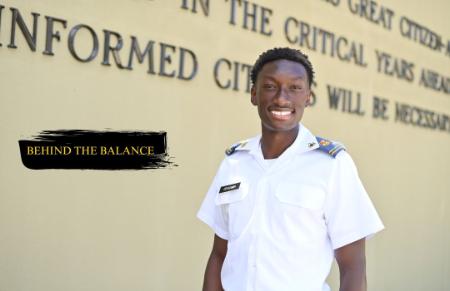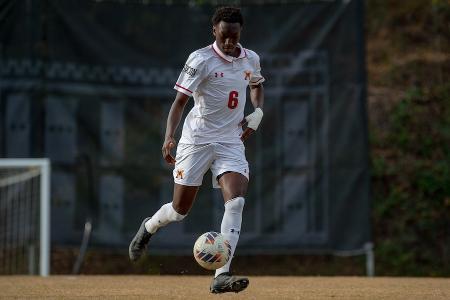Behind the Balance: Amari Benjamin ’27 — Keydet Men’s Soccer
Virginia Military Institute’s cadet-athletes have to juggle cadet life, heavy academic course loads, and their NCAA Division I sport. Committed to both academic and athletic pursuits, balancing their rigorous schedule in both sports and school requires a certain level of commitment and discipline. Behind the Balance is a series that focuses on those cadet-athletes and how they handle the hurdles of the day-to-day.
LEXINGTON, Va. Oct. 13, 2025 — A sense of discipline is what drew Amari Benjamin ’27 to Virginia Military Institute.
“I knew that I wanted that in my life, and I knew that would set me up forever," he said. “I also wanted the option to commission, because I was on the fence and I got the opportunity to play soccer here as well.” 
Benjamin, an economics and business major, plans on commissioning into the U.S. Army. Having the option to play soccer at VMI was a big draw for Benjamin. After a soccer camp with the VMI soccer coach, Nick Regan, his interest was piqued.
“I wasn't originally interested in VMI. I didn't really know what it was, either," Benjamin admitted. “But then Coach Regan reached out to me saying, we're interested. He gave me a little breakdown on the school and then did my own research. My dad was in the Navy, so I've always been in that military setting at home too ... it wasn't that big of an adjustment.”
Cadet-athletes at VMI not only have their responsibilities with their selected sport but cadet duties on top of that. Cadets are also required to take physical fitness classes twice a week, participate in ROTC all four years, prepare for room and uniform inspections, practice for parade, guard duty, and more.
Benjamin has a packed schedule with 17.5 credits as well as serving as an S9 Sergeant. With that comes a multitude of duties including preparing for pep rallies, company athletics activities, and creating permits and Concept of Operations (CONOPS) documents. S9 is primarily made up of athletes, so cadets involved must pick up where it’s needed when those on the staff are in season.
“S9 is an amazing staff because we all know how much we put in on the field or court, so we are always quick to have each other backs and help when help is needed,” he said. “When it's S9 time, it's S9 time. Allowing me to segment my day with school, soccer, and rank allows me to stay on top of things and not get burnt out.”
His days start early while he’s in season — around 6 a.m. for a team run or a quick session on the field before breakfast. Then it’s classes until the afternoon and straight to practice, which lasts until after 6:30 p.m. Then he’s back to studying and class assignments.
“I like to get a lot of my work done out the way early. I don't want to stay up late because I wake up in the morning feeling groggy,” he explained. "Usually throughout the day, from whenever we finish that first training until before practice, it's only school. That way, at least at night, I can only focus on whether I have an exam the next day or I can focus on one thing and not have to over stretch myself.” 
Benjamin has had to find a balance in structuring all his tasks. In the beginning, he found it tough to do so.
“My first year playing Division I soccer, all of that was overwhelming. It wasn't until my sophomore year that I really was able to crack down on it and build good habits and get into a routine,” he stated.
He especially must plan with traveling for games, which they have a packed schedule of nearly 20 games during a season.
"When I know I have an away game coming, I try to overly stress the fact that I need to finish all this, because I go into the game with just the game in mind, and not have to worry about an assignment due at 11:59 p.m.,” he explained. “Usually, I try to plan out my days well. I feel like every assignment I get or every reading I'm assigned, I always put in my notes, and I try to get it done that day, if possible. That way, later in the week, when the games do come around, it's just straight soccer.”
Benjamin said the skills he’s learned at VMI will translate into his life, no matter what he does. He says the ability to multitask and prioritize has helped him plan his days properly.
“I feel like one piece of advice that my dyke [senior mentor] also told me was, at the end of the day, you're going to go to bed, and the next morning you're going to wake up,” he commented. “You've just got to get through the rest of the day, and nothing can really hinder you. At the end of the day, if you just do what you need to do and get through it, there's a whole new day waiting for you.”
Laura Peters Shapiro
Communications & Marketing
VIRGINIA MILITARY INSTITUTE
.svg)
.png)